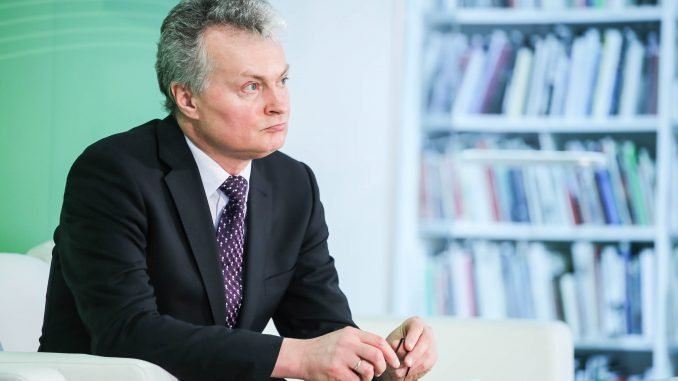
As tensions on the Belarusian-Polish-Baltic border continue to escalate, outgoing German Chancellor Angela Merkel, in her capacity as a representative of the West, has, after more than a year, had a conversation with the illegitimate Belarusian leader Aliaksandr Lukashenko, Andresa Repšytė writes in tv3.lt
As soon as the news broke, Lithuanian President Gitanas Nausėda told the BBC that he supported the Chancellor’s move, as he sees the talks as a way to solve the humanitarian crisis. However, this statement by the head of state surprised both experts and politicians. According to them, the European Union’s position is completely different.
“I think there is a possibility to solve the crisis by addressing Mr Lukashenko as well, as Angela Merkel just did. We have to talk to the person who is responsible for what is happening on the border,” Mr Nausėda told the BBC in an interview on Tuesday.
He said that Belarus should also be consulted about the humanitarian problems caused by the crisis.
“We also need to talk about humanitarian problems, not only with Poland or Lithuania or other EU countries, but first of all with Belarus, because it is responsible for what is happening on its territory,” the President said.
According to the President, it is therefore important to turn to the EU institutions and ask the Community to change its migration policy and contribute to the construction of a physical barrier on the border with Belarus.
“We need to appeal to the EU institutions, not only on migration and asylum policy, but also on the construction of a physical barrier between Poland and Belarus, and between Lithuania and Belarus, because now Lithuania and Poland are defending Western democracy. We are trying to prevent those people from going further – to Germany. We are trying to do the best we can to protect the EU,” he said.
Lithuania’s position on Belarus’ actions must be consistent, he said
The President’s position seems to be changing. Only last week he told the news portal 15 min.lt that “the European Union does not talk to leaders who are illegitimate”, but now he is calling for talks with the Belarusian regime.
Žygimantas Pavilionis, Chairman of the Seimas Committee on Foreign Affairs, also points out that Mr Nausėda has also argued at the European Summit that “Lukashenko is illegitimate and should be sanctioned for shooting people”.
This, according to Ž. Pavilionis, was echoed by foreign ministers of other countries when they said that the actions with Poland and the Baltic States were a crime and should be punished.
“I would say that it also contradicts the long-standing guidelines of Lithuania’s foreign policy, such as the strategic partnership with Poland, which was established by a unanimous vote in the Lithuanian Seimas, when on the occasion of the Independence Day, all parties supported Poland on this very subject.
Given the President’s excellent relations with President Andrzej Duda, it is difficult to understand such a change, all the more so because Polish colleagues are deeply surprised, they compare it (the situation on the border with Belarus – author’s note) with various historical periods – with Nord Stream,” the politician said on the Radio Žinių.
Political analyst Linas Kojala echoed him, stressing that in this situation it is particularly important that Lithuania’s position towards the regime be consistent.
“We have seen some good steps forward in recent weeks: a consensus within the country on the possible application and use of NATO Article 4 – under what circumstances this would be done. In terms of a united Baltic reaction to events and treatment – which is also very significant – and the close relationship with Poland – all of this is important both at national and regional level.
If we want to talk about this, all the countries in the region and their individual officials need to speak with one voice,” said Mr Kojala, adding that in this situation too, there would be no divisions, ambiguities or uncertainties.
“It is very important that the message coming out of Vilnius, Warsaw, Riga and Tallinn does not cause any doubts among our partners in the West,” Kojala underlined.
Merkel spoke to Lukashenko by phone
A. Merkel spoke to Lukashenko on Monday about “the difficult situation on the Belarus-EU border, in particular the need to provide humanitarian aid to refugees and migrants there”, according to the Chancellor’s spokesman.
Last week, Lukashenko’s ally, Russian leader Vladimir Putin, urged EU leaders to talk directly to Belarus’ authoritarian leader to resolve the migration crisis.
On Monday evening, Putin also discussed the crisis at the Belarusian-Polish border with French President Emmanuel Macron. On Monday, the EU gave the green light to new sanctions against the Lukashenko regime for its role in fuelling the crisis.
Nausėda’s clarification from the Presidency
Later on Tuesday, the Presidency issued a press release containing Nauseda’s clarification of what he meant in his interview with foreign media.
“Lithuania’s position towards the Belarusian regime has been and will continue to be consistent – we are extending sanctions against the regime, demanding the release of political prisoners, democratic elections and an end to the use of migrants as a weapon of hybrid attack. The whole world sees the human tragedy of migrants held hostage by the regime. I support German Chancellor Angela Merkel’s efforts to find solutions to repatriate migrants to their countries of origin. For the international community to talk to Mr Lukashenko in order to rescue the people trapped at the border is neither a legitimisation nor a recognition of the regime.


Be the first to comment